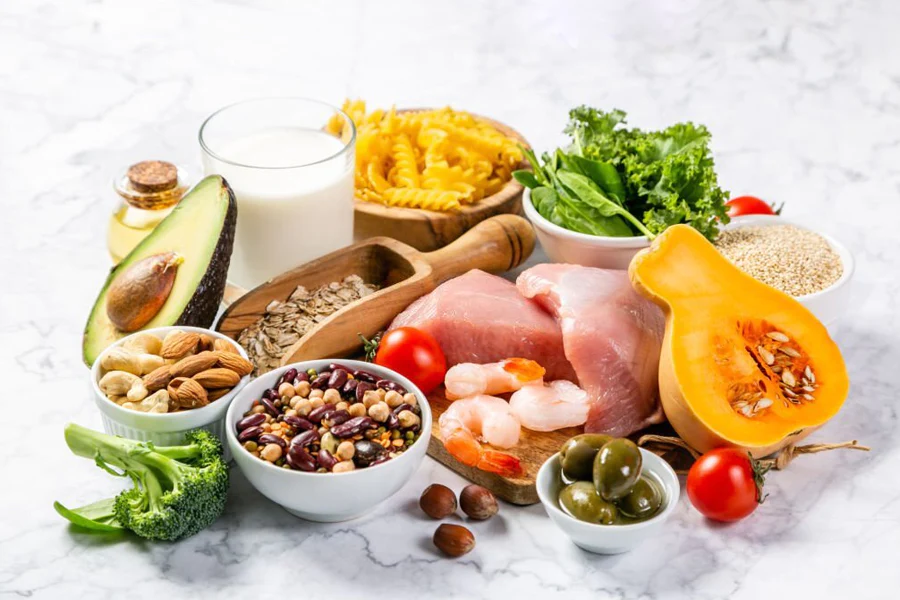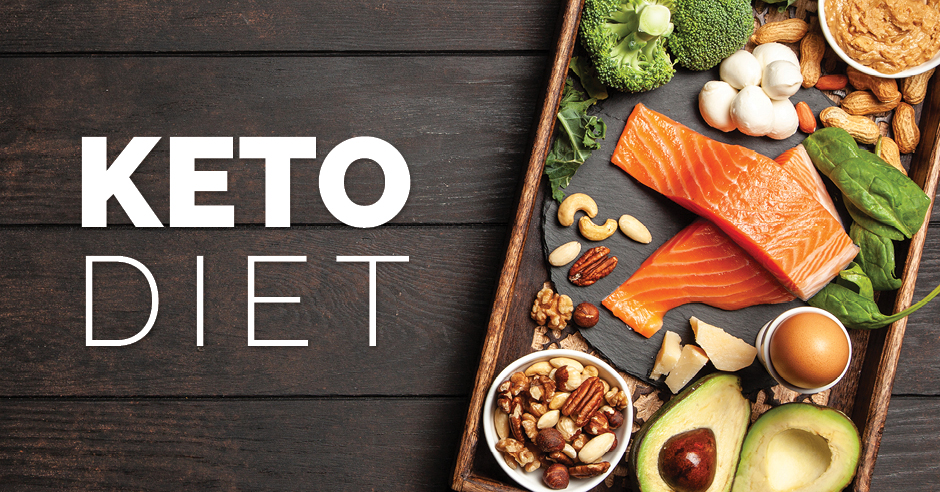A keto diet or ketogenic diet is highly restricted carbohydrate (<25-50g/day) diet to induce a rapid weight loss. The caloric needs of carbohydrates are replaced by healthy fats. This diet is designed to transfer the body into ketosis state. In ketosis state, body gets it energy from ketones (fats) instead of from glucose (carbohydrates).
The recommendation for Ketogenic diets are 5% of calories comes from carbohydrates, along with 20% from protein and 75% from fat.
The Science of Ketogenic Dieting
Body’s primarily source for energy is carbohydrates. TheseCarbohydrates are broken down into simple sugar (glucose) for intense energy use, and store rest into glycogen in liver and muscles for future use.
In ketogenic diet carbohydrate intake is limited, so in this condition glycogen store are depleted within two days. Hence the absence of carbohydrates and glycogen forces the body to get its energy by breaking stored fat into molecules called fatty acids. Liver in turs converts these fatty acids into ketones. Ketones are potentially known as alternative fuel source to the body and brain.
Simple Steps to Achieving Nutritional Ketosis

Achieving and maintaining nutritional ketosis may seem difficult, but it can be simpler with the right choice and right guidance. Here we are discussing some simple steps which help you in maintaining healthier lifestyle through nutritional ketosis.
Reduce Carbohydrate Intake
You should restrict your daily carbohydrate intake to 20 to 50 grams depending on your needs and goals. The primary concentration should be on whole, low-carb meals like almonds, leafy greens, and other non-starchy veggies.
Increase Healthy Fats
Introduce healthy fats in your dies such as avocados, olive oil, coconut oil, and fatty fish. These fats will become your primary source of energy in ketosis.
Moderate Protein Consumption
Consume a moderate amount of protein to maintain muscle mass while avoiding excess protein, which can be converted into glucose and hinder ketosis. High-quality sources include poultry, fish, and tofu.
Stay Hydrated
It’s crucial to drink enough water. Drink a lot of water is important to support your body’s processes and lower your risk of dehydration, which is a typical problem during ketosis.
Track Macros and Calories
Utilize a meal monitoring software to keep track of your daily consumption of protein, lipids, and carbs to stay within your desired ranges.
Implement Intermittent Fasting
Consider intermittent fasting, which can enhance ketone production by allowing your body to enter a fasting state.
Include Ketogenic Foods
Include keto-friendly foods like eggs, cheese, butter, and low-carb vegetables in your meals.
Monitor Ketone Levels
Invest in ketone test strips or a blood ketone meter to track your ketone levels and ensure you’re in ketosis.
Be Patient
Achieving nutritional ketosis may take time, as it varies from person to person. Be patient with your body’s adjustment process.
Keto Diet Food List

Here’s a list of foods that are commonly included in a keto diet
| Fats | Avocado and avocado oil, Olive oil, Coconut oil and coconut products, Butter and ghee (clarified butter), Nuts and seeds (in moderation), Fatty fish (salmon, mackerel, sardines), Heavy cream, Cheese (in moderation), Bacon and fatty cuts of meat |
| Proteins | Lean meats (chicken, turkey, lean cuts of beef), Fatty cuts of meat (beef, pork, lamb), Fish and seafood (salmon, trout, shrimp), Eggs, Poultry (chicken, turkey) |
| Low-Carb Vegetables (in limited quantities) | Leafy greens (spinach, kale, arugula), Cruciferous vegetables (broccoli, cauliflower, Brussels sprouts), Zucchini, Bell peppers, Cucumber, Asparagus, Mushrooms |
| Dairy (in moderation) | Full-fat yogurt (unsweetened), Full-fat milk (in limited quantities), Hard cheeses (cheddar, mozzarella), Soft cheeses (cream cheese, brie) |
| Condiments and Seasonings | Salt, Pepper, Herbs and spices (avoid blends with added sugar), Sugar-free hot sauces, Mustard, Vinegar (white or apple cider) |
| Beverages | Water (essential for hydration), Unsweetened tea and coffee, Sparkling water (unsweetened), Herbal tea (without added sugars) |
| Sweeteners (used sparingly) | Stevia, Erythritol, Monk fruit extract |
Foods to avoid on a keto diet
| Sugary Foods | Candy, soda, fruit juices, and most desserts |
| Starchy Foods | Bread, pasta, rice, and grains |
| High-Carb Fruits | Bananas, apples, grapes, and most tropical fruits |
| Legumes | Beans, lentils, and chickpeas |
| Root Vegetables | Potatoes, sweet potatoes, and carrots |
| Processed Foods | Anything with added sugars or hidden carbohydrates |
Health Benefits of Keto Diet
In addition to only helping people lose weight, the ketogenic (keto) diet has attracted attention for its possible health advantages. Following are some potential health advantages of the keto diet, yet they may not apply to everyone and should be used with caution:
Weight Loss
One of the most well-known benefits of the keto diet is its ability to promote rapid weight loss, primarily through the loss of stored body fat.
Improved Blood Sugar Control
The ketogenic diet is beneficial for type 2 diabetes or pre diabetic patients as it regulates blood sugar level by reducing carbohydrates intakes.
Enhanced Mental Clarity
People with keto diet show significant improvement in their mental clarity and focus because of stable energy that produces from ketones.
Epilepsy Management
Children with epilepsy benefit from ketogenic diets because they lessen seizure frequency and intensity.
Lower Triglycerides
Triglyceride levels are lowered by the keto diet, which is good for heart health.
Improved HDL Cholesterol
The levels of high-density lipoprotein (HDL) may increase due to keto diet. HDL is also called as “good” cholesterol and is associated with a lower risk of heart disease.
Appetite Control
The keto diet can help control appetite and reduce cravings due to its satiating effect from high-fat foods.
Potential Cancer Therapy
Cancer cells usually depend on glucose for energy, so the keto diet is useful in some cancer treatment therapies as it reduces the carbohydrates intake.
Polycystic Ovary Syndrome (PCOS) Management
The main cause of PCOS is hormonal imbalance. The keto diet may help in regulating hormonal imbalance which in turn leads to improved menstrual cycles and fertility.
Conclusion
The keto diet can be a powerful tool for weight loss and may offer metabolic benefits for some individuals, its effectiveness and safety ultimately depend on individual factors, such as genetics, medical history, and lifestyle preferences. Before embarking on a keto journey, it’s crucial to consult with a healthcare professional to determine if it’s the right dietary approach for your unique needs and to ensure that you follow it in a balanced and sustainable way.

